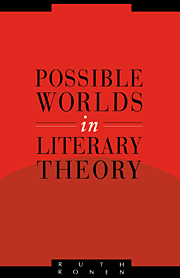Book contents
- Frontmatter
- Contents
- Acknowledgments
- Introduction
- 1 Possible worlds, fictional worlds
- 2 The possibility of fictional worlds
- 3 The Fictionality of fictional worlds
- 4 Fictional entities, incomplete beings
- 5 Fictional events and the intricacies of plot
- 6 Focalization and fictional perspective
- 7 Fictional time
- Conclusion
- Bibliography
- Index
4 - Fictional entities, incomplete beings
Published online by Cambridge University Press: 12 November 2009
- Frontmatter
- Contents
- Acknowledgments
- Introduction
- 1 Possible worlds, fictional worlds
- 2 The possibility of fictional worlds
- 3 The Fictionality of fictional worlds
- 4 Fictional entities, incomplete beings
- 5 Fictional events and the intricacies of plot
- 6 Focalization and fictional perspective
- 7 Fictional time
- Conclusion
- Bibliography
- Index
Summary
Existence and fictional existence
Every literary work is in principle incomplete and always in need of further supplementation; in terms of the text, however, this supplementation can never be completed. (Ingarden, 1973: 251)
Ingarden's definitive statement on the nature of the represented objects intended by a literary work summarizes the three basic facets revealed in the mode of existence of fictional entities:
represented objects are never fully determined in all their aspects;
spots of indeterminacy are never totally absent from fictional objects;
while reading a literary work we are seldom aware of any gaps or spots of indeterminacy.
These three facets of fictional existence represent in fact the complex of logical, semantic and rhetorical considerations (respectively) involved in the attempt to clarify the mode of being of fictional entities. Taking Ingarden's early formulations as a point of departure, together with later models for fictional existence and the approach to the problem of fiction developed in the previous chapters of the present study, an explication of some of the intricacies involved in a description of the fictional domain of objects will be attempted.
The domain of fictional entities poses the most obvious problem for the view of fiction portrayed in previous chapters. Fictional entities seem to deny a pragmatic definition of fictionality because they simply do not exist. However radical the degree of relativism one might adopt regarding the status of fiction vis à vis reality, it cannot change the fact that Natasha in War and Peace, with whom we share the most intimate thoughts, is a nonexistent, whereas a Natasha in the remotest Russian village, about whom we know practically nothing, does exist.
- Type
- Chapter
- Information
- Possible Worlds in Literary Theory , pp. 108 - 143Publisher: Cambridge University PressPrint publication year: 1994



